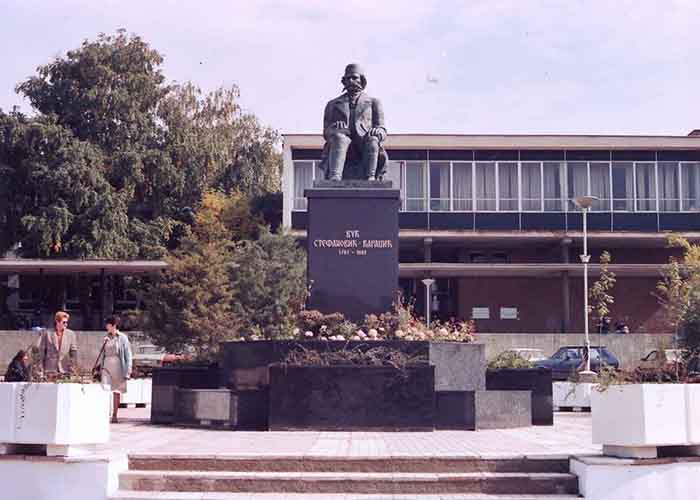Within the Faculty of Philosophy in Priština, in 1961/1962, four new departments began to operate: Biology, Chemistry, Physics and Mathematics, followed by the department of Geography in 1971/1972. The department of Informatics, the most recent one, was founded in 2002/2003.
In 1971/1972, the departments for natural sciences became independent from the Faculty of Philosophy and were joined to form The Faculty of Sciences. The year the Faculty began operating, a total of 1661 students enrolled (1108 of these attended classes in Albanian language, while 553 students attended classes in Serbian). The Faculty of Sciences, temporarily settled in Kosovska Mitrovica, has been situated in the building of the School of Technical Sciences ,,Mihajlo Petrović Alas“, 29 Lola Ribar Street, since 2002/2003.
Today, The Faculty of Sciences of the Priština University is an accredited institution of higher education, licensed by the Ministry of Education, which employs 101 staff and faculty (74 faculty members). The Faculty, which meets all required educational standards, is also accredited for performing scientific research activities within its scope of work.
The teachers and teacher assistants of the Faculty participate in scientific research projects funded by the Ministry of Education and Science of the Republic of Serbia. Their research results have been published in renowned international and domestic journals. In addition, they are authors of a significant number of textbooks, monographs, collections of assignments and more.

The Faculty has established a successful cooperation with the universities of Serbia as well as a large number of other scientific institutions both within the country and abroad.
Modernly equipped, and with competent staff, the Faculty has successfully educated experts in the field of natural sciences, mathematics and informatics for 40 years. During these four decades, it has also contributed greatly to the development of Kosovo and Metohija, and even the Republic of Serbia as a whole.
The Faculty offers the following study programmes (16 in total):
The Faculty is organized into six departments:
The departments represent organizational units of the Faculty through which studies are realised based on the curricula and study programs. Bachelor studies at the aforementioned departments last four years (or eight semesters), conferring 240 ECTS credits. Master academic studies last one year (or two semesters), conferring 60 ECTS credits. The Department of Chemistry and the Department of Biology offer postgraduate, doctoral academic studies, which last three years, comprising of a total of 180 ECTS credits. The focus is on practical work, group work and seminar papers, on which students work throughout the school year.
All of the departments have been reformed in accordance with the Bologna declaration. The curriculum has been adapted to ensure that the majority of courses last only one semester, which has significantly improved the efficacy of studies.
Lectures and practice classes are held regularly, in accordance with the established schedule which is published before the beginning of the semester, both on the notice board and the website of the faculty. Practical classes in the field of physics, chemistry and biology are performed in laboratories equipped for that purpose. The Department of Biology uses laboratories for ecology and systematic plant physiology, animal physiology, biochemistry and genetics. The Department of Physics has laboratories for computer sciences and electronics, electromagnetism and optics, as well as laboratories for general physics at its disposal. The Department of Chemistry can make use of the laboratories for inorganic, organic and analytical chemistry. The classrooms used for informatics and computer science classes at the Faculty are equally well-equipped; latest generation computers and Internet access are provided.
The Faculty also has a library with a reading room, in which the necessary books, journals, defended doctoral dissertations, master's theses and diploma theses from all fields of natural, mathematical and information sciences are all available to students.
Given that higher education is the basis for both the economic and cultural progress of the society and its development in general, the aim of the Faculty is to provide the highest academic standards to students and ensure their optimal acquisition of knowledge and skills. To achieve this, the Faculty is committed to continual striving for improvement within the domain of quality of education, aiming particularly at meeting the educational needs of the young generations.
The ultimate goal of our Faculty is to achieve the highest possible level of quality in education, and to perform as an equal among the institutions of the unified European system of higher education and scientific research. In order to realize this, the Faculty will continue to insist on expanding its framework of competencies and on partnering with both national and foreign universities, as well as promoting and adopting positive trends within the global education and research system.
Aiming towards study programs which are in accordance with the latest scientific trends, as well as towards achieving and preserving the quality of teaching is what will ensure that the Faculty retains its competence and efficiency while remaining compatible with the relevant faculties of the EU member states.